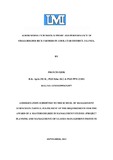| dc.contributor.author | OJOK, Francis | |
| dc.contributor.author | Dr. Kugonza, Sylvester (Supervisor) | |
| dc.contributor.author | Alinda, Fred (Supervisor) | |
| dc.date.accessioned | 2017-05-17T06:34:48Z | |
| dc.date.available | 2017-05-17T06:34:48Z | |
| dc.date.issued | 2015-09 | |
| dc.identifier.citation | APA | en_US |
| dc.identifier.other | 13/MMSPPM/31/077 | |
| dc.identifier.uri | http://hdl.handle.net/20.500.12305/119 | |
| dc.description | A Dissertation Submitted to the School Of Management Sciences in Partial Fulfilment of the Requirements for the Award of a Masters Degree in Management Studies (Project Planning and Management) of Uganda Management Institute. | en_US |
| dc.description.abstract | Many concerns have been raised on the extent to which agribusiness extension support contributes to performance of smallholder rice farmers, In light of the challenges facing implementation of NAADS agribusiness extension programme, this study establishes the influence of agribusiness extension support on performance of smallholder rice farmers in Amolatar District. Specifically, the study sought to establish the extent to which access to agribusiness advisory services; agribusiness technologies and Farmer Institutional Development support influences performance of smallholder rice farmers in the District. The study employed a cross sectional research design and used both quantitative and qualitative approaches to collect and analyze data from 174 respondents. The quantitative analysis employed ANOVA to test for statistical significance of differences in mean yield, profits and incomes between beneficiaries and non-beneficiaries of NAADS agribusiness support.
The study findings revealed significant differences (p<0.05) in productivity, profitability and income between beneficiaries and non-beneficiaries of NAADS agribusiness advisory services. Significant differences were also realized in productivity and incomes between farmers who accessed NAADS agribusiness technologies and those who did not otherwise. Further still, significant differences (p<0.05) were observed in productivity and incomes between members and non-members of NAADS farmer groups. In terms of magnitude for example, farmers who accessed NAADS advisory services, realized significantly higher yields by 29.9%, higher profits by 25.5% and incomes by 33.6%. Those who accessed agribusiness technologies had differences in yield by 35.5%, profit by 29.9 % and incomes by 21.2% while FID support revealed differences in yield by 41.3%% and incomes by 27.3 %. Based on these findings, it was concluded that NAADS agribusiness extension support significantly contributed to performance of smallholder rice farmers in terms of enhancing their productivity and incomes.
The study recommends the need for concrete extension structure and system in Uganda for efficient and effective delivery of agribusiness extension support to smallholder farmers and scaling up agribusiness support towards enhancing farmers’ access to incomes and improving their livelihood. The study suggested areas for future research in performance of other enterprise supported by NAADS, why NAADS extension programme failed, extension performance under Operation Wealth Creation and single spine systems in Uganda.. | en_US |
| dc.language.iso | en | en_US |
| dc.publisher | Uganda Management Institute | en_US |
| dc.subject | Agribusiness Extension | en_US |
| dc.subject | Smallholder Rice Farmers | en_US |
| dc.subject | Amolatar District | en_US |
| dc.title | Agribusiness Extension Support and Performance of Smallholder Rice Farmers in Amolatar District, Uganda. | en_US |
| dc.type | Thesis | en_US |

